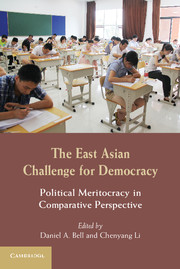Book contents
- Frontmatter
- Dedication
- Contents
- Contributing Authors
- Acknowledgments
- Introduction
- Section I The Theory of Political Meritocracy
- 1 Political Meritocracy and Meritorious Rule
- 2 A Confucian Version of Hybrid Regime
- 3 Confucian Meritocracy for Contemporary China
- 4 The Liberal Critique of Democracy
- 5 Meritocratic Representation
- Section II The History of Political Meritocracy
- Section III Realizing Political Meritocracy Today
- Index
- References
1 - Political Meritocracy and Meritorious Rule
A Confucian Perspective
Published online by Cambridge University Press: 05 June 2014
- Frontmatter
- Dedication
- Contents
- Contributing Authors
- Acknowledgments
- Introduction
- Section I The Theory of Political Meritocracy
- 1 Political Meritocracy and Meritorious Rule
- 2 A Confucian Version of Hybrid Regime
- 3 Confucian Meritocracy for Contemporary China
- 4 The Liberal Critique of Democracy
- 5 Meritocratic Representation
- Section II The History of Political Meritocracy
- Section III Realizing Political Meritocracy Today
- Index
- References
Summary
POLITICAL MERITOCRACY AND MERITORIOUS RULE
“Political meritocracy” is defined in this volume as “the idea that a political system should aim to select and promote leaders with superior ability and virtue.” Political meritocracy is thus different from democracy, which selects officials according to the votes of citizens; it is also different from monarchy, which selects rulers according to the principle of heredity. Political meritocracy is not equivalent to “meritorious rule” or “meritorious governance.” The former is primarily a selection principle and mechanism, and the latter is a quality of government or governance. “Meritorious rule” or “governance” refers to the fact that those in power are in fact of merit and do govern effectively.
It is important to distinguish between political meritocracy and meritorious rule in the context of a debate on the pros and cons of meritocracy. Meritocracy, one might argue, does not guarantee the selection of the meritorious – selection mechanisms may be imperfect or faulty and fail to assess the appropriate merit or prevent abuse in the selection process. Meritocracy also does not guarantee meritorious governance, for the meritocratically selected may not govern effectively. In addition, under certain favorable conditions, nonmeritocratic systems such as monarchy and democracy might achieve meritorious governance to a considerable extent.
- Type
- Chapter
- Information
- The East Asian Challenge for DemocracyPolitical Meritocracy in Comparative Perspective, pp. 31 - 54Publisher: Cambridge University PressPrint publication year: 2013
References
- 12
- Cited by



